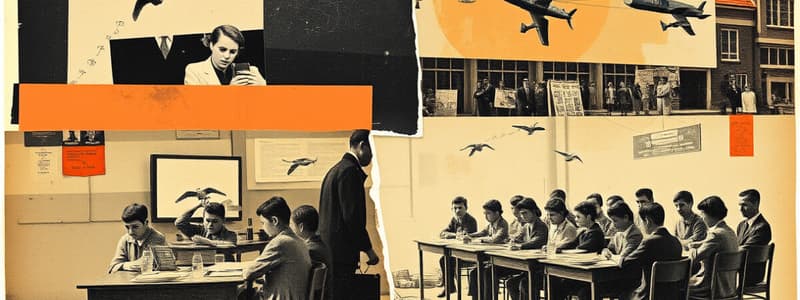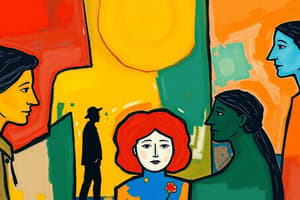Podcast
Questions and Answers
What is the primary role of education in society according to Talcott Parsons?
What is the primary role of education in society according to Talcott Parsons?
- To serve as a bridge between individual values and societal norms. (correct)
- To promote family values over societal values.
- To enforce strict discipline among students.
- To facilitate job training for specific roles.
Which concept explains the transition from ascribed status to achieved status in education?
Which concept explains the transition from ascribed status to achieved status in education?
- Norm enforcement.
- Secondary socialization.
- Cultural capital.
- Meritocracy. (correct)
What constitutes the hidden curriculum in education?
What constitutes the hidden curriculum in education?
- The cultural values and norms implicitly taught through educational practices. (correct)
- Extracurricular activities offered by schools.
- Standardized tests and formal assessments.
- The formal content taught in classrooms.
How does education impact competition among students?
How does education impact competition among students?
What is a critique offered by Marxists regarding the hidden curriculum?
What is a critique offered by Marxists regarding the hidden curriculum?
What do contemporary educational policies emphasize in relation to the hidden curriculum?
What do contemporary educational policies emphasize in relation to the hidden curriculum?
According to the functionalist perspective, why is the teaching of individualism important?
According to the functionalist perspective, why is the teaching of individualism important?
What is a key implication of the competition fostered by education systems like that in the U.S.?
What is a key implication of the competition fostered by education systems like that in the U.S.?
Flashcards are hidden until you start studying
Study Notes
Talcott Parsons' Ideas on Education
- Developed Durkheim's functionalist views on education, emphasizing education's role in society.
- Introduced the concept of secondary socialization, acting as a bridge between home and wider societal values.
- Education converts particularistic values (specific to individuals or groups) into universal values applicable to all, preparing students for societal norms.
Functions of Education
- Transforms ascribed status (inherent roles) into achieved status (earned based on merit).
- Promotes meritocracy, where success is determined by abilities and efforts rather than familial background.
- Encourages individualism over collectivism to prepare students for professional environments stressing personal achievement.
Hidden Curriculum
- Implicit teachings within education include acceptance of hierarchies, punctuality, and compliance with rules.
- Rewards positive behavior, while non-conformity faces sanctions, ensuring students learn societal expectations.
- Assessments and qualifications serve to gauge individual performance, influencing future educational and job opportunities.
Competition and Its Impact
- Education fosters competition among students, encouraging personal achievement reminiscent of workplace environments.
- In systems like the U.S., rankings and awards (e.g., valedictorian status) highlight individual accomplishments.
Contemporary Applications
- Schools enforce uniform policies and disciplinary measures to establish universal behavioral standards.
- Media frequently reports on disciplinary actions for non-conformity to dress codes, indicating strict adherence to norms.
- Educational policies emphasize teaching cultural capital and literacy as part of the hidden curriculum.
Social, Moral, Spiritual, and Cultural Education
- Schools are responsible for imparting shared norms and values implicitly through non-traditional curricula.
- This education is crucial for student understanding of societal expectations and successful integration into society.
Critiques of Functionalist Perspectives
- Marxist Critique: The hidden curriculum perpetuates capitalism and ruling class values while ignoring those of the lower classes; individualism is seen as a method to prevent worker revolution.
- Post-Modernist Critique: Argues that universal values are outdated; society is too fragmented and diverse for singular norms to apply, leading to a dilution of educational impacts.
Future Considerations
- Exploration of the role of habitus in education is necessary, particularly regarding its influence on working-class experiences and academic achievement.
Talcott Parsons' Ideas on Education
- Expanded on Durkheim's functionalism, highlighting education's societal significance.
- Introduced secondary socialization, connecting home values to broader societal expectations.
- Education transitions particularistic values into universal societal norms, preparing students for participation in society.
Functions of Education
- Converts ascribed status into achieved status, promoting merit-based success.
- Advocates for meritocracy, emphasizing that abilities and efforts dictate success, rather than social background.
- Individualism is emphasized over collectivism, aligning with professional environments that prioritize personal accomplishments.
Hidden Curriculum
- Education conveys implicit lessons such as hierarchy acceptance, punctuality, and rule compliance.
- Positive behavior is rewarded, while non-conformity faces consequences, teaching societal norms through indirect methods.
- Assessments and qualifications function as indicators of individual performance, impacting future educational and career opportunities.
Competition and Its Impact
- Education fosters competitive dynamics among students, mirroring the achievement-oriented nature of workplaces.
- Systems like the U.S. highlight individual accomplishments through rankings and awards, such as valedictorian honors.
Contemporary Applications
- Schools implement uniform dress codes and disciplinary actions to create consistent behavioral expectations.
- Media coverage on disciplinary measures for dress code violations underscores the importance of conformity to established norms.
- Educational policies incorporate teaching of cultural capital and literacy within the hidden curriculum.
Social, Moral, Spiritual, and Cultural Education
- Schools play a key role in instilling shared norms and values through non-traditional teaching methods.
- This aspect of education is essential for helping students grasp societal expectations and achieve successful societal integration.
Critiques of Functionalist Perspectives
- Marxist Critique: The hidden curriculum reinforces capitalism and ruling class ideologies while marginalizing lower-class perspectives; individualism is argued to suppress collective worker movements.
- Post-Modernist Critique: Contends that the concept of universal values is obsolete due to societal fragmentation and diversity, suggesting diluted educational consequences.
Future Considerations
- Emphasis on investigating the role of habitus in education, particularly regarding its effects on working-class experiences and academic success.
Studying That Suits You
Use AI to generate personalized quizzes and flashcards to suit your learning preferences.




